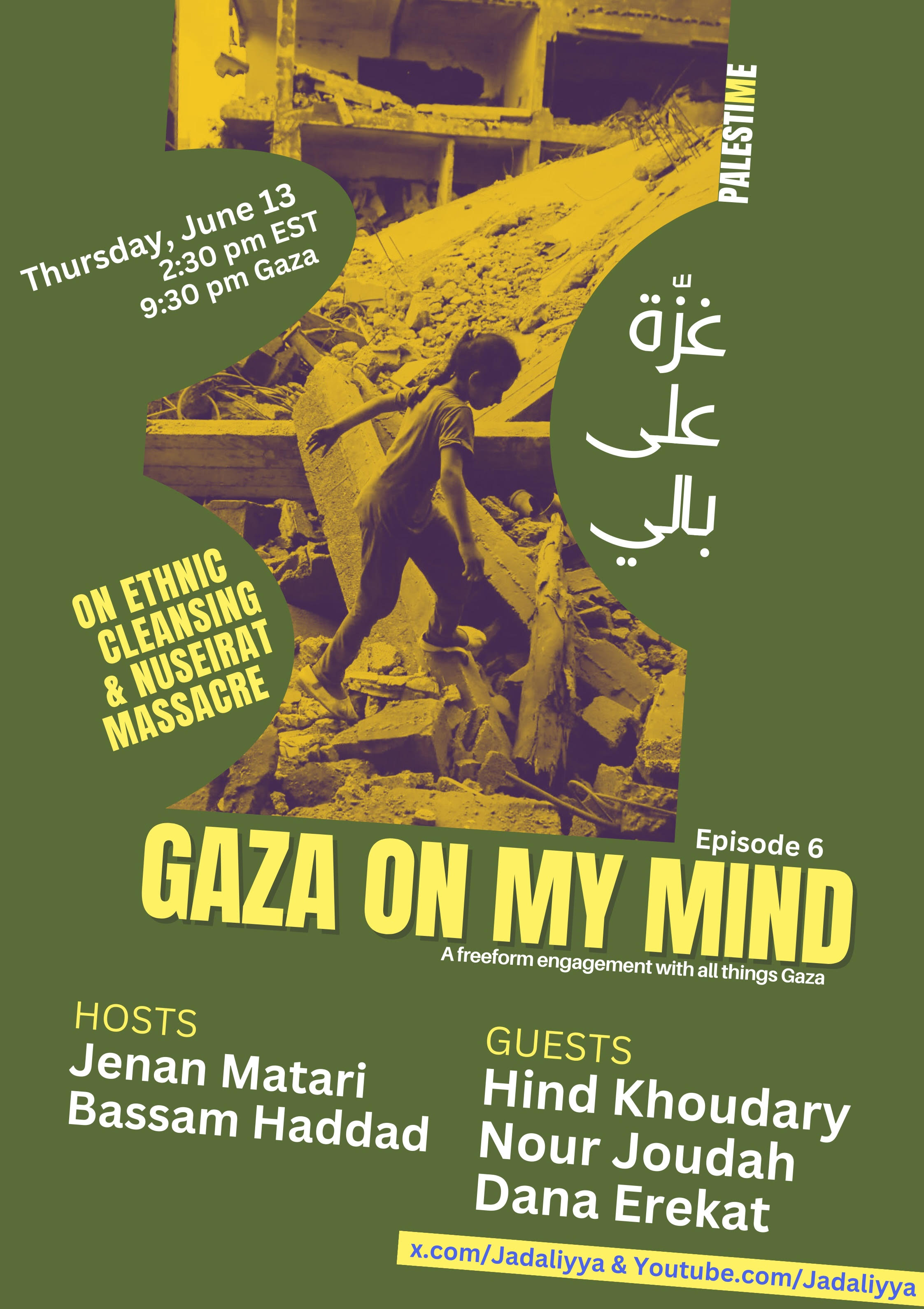Gaza On My Mind
غزّة علي بالي
A Freeform Engagement with All Things Gaza
Featuring:
Hind Khoudary
Nour Joudah
Dana Erakat
Hosts:
Jenan Matari
Bassam Haddad
Thursday, 13 June 2024
2:30PM EST | 7:30PM London | 9:30PM Gaza
Join us this Thursday for our 6th conversation of Gaza On My Mind \ غزّة على بالي, featuring once again Hind Khoudary’s (@Hind_Gaza) heroic reporting from ground zero in Gaza, Nour Joudah (@nsdoud), addressing the horror of lost family members in Nuseirat, and Dana Erakat along with hosts addressing Israel’s ethnic cleansing, then and now. Hosted by @JenanMatari & @4bassam. 2:30 pm EST, 9:30 pm Gaza.
Live here at X.com/Jadaliyya and Youtube.com/@Jadaliyya/Streams.

Hind Khoudary / هند خضري is a Palestinian journalist based in Gaza. Khoudary has written for Middle East Eye, Anadolu Agency, and +972 Magazine and worked for RT. Her posts on Twitter and Instagram have been cited by The New York Times, NPR, and Utusan Malaysia. In March 2019, Khoudary worked for Amnesty International on a free-lance basis, during which she provided footage of the Great March of Return protests and reported on Hamas violations against protesters. She was arrested by Hamas forces, and was interrogated for three hours, during which she was threatened and told to remove certain Facebook posts.
Dana Erekat is a Palestinian American architect and planner with over 14 years of experience in the field of international development and planning. She has worked across a range of sectors including international organizations, NGOs, and both the private and public sectors. Her professional journey has taken her to the United States, Kuwait, Palestine, and Jordan. From 2013-2016, she was Head of Aid Management and Coordination Directorate/ Advisor to the Minister at the Palestinian Ministry of Planning and Administrative Development, during which she led the technical committee for the 2014 Gaza Reconstruction plan. She is currently the CEO of the impact data analytic company Whyise. Dana is the author of several publications and photography series focused on colonial planning practices. She previously served as the Director of Communications for the MIT Arab Alumni Association, and was a Munich Young Leader Alumna, an MIT Humphrey SPURS fellow, and a Research Fellow at the Kenyon Institute in Jerusalem. She has a BA in architecture from UC Berkeley and a Masters in City Planning from MIT.
Jenan Matari (Host) is a 2x award-winning Palestinian storyteller and Producer. She is so busy, we are still waiting for the rest of her bio.
Bassam Haddad (Host) is Director of the Middle East and Islamic Studies Program and Associate Professor at the Schar School of Policy and Government at George Mason University. He is the author of Business Networks in Syria: The Political Economy of Authoritarian Resilience (Stanford University Press, 2011) and co-editor of A Critical Political Economy of the Middle East (Stanford University Press, 2021). Bassam is Co-Founder/Editor of Jadaliyya Ezine and Executive Director of the Arab Studies Institute. He serves as Founding Editor of the Arab Studies Journal and the Knowledge Production Project. He is co-producer/director of the award-winning documentary film, About Baghdad, and director of the acclaimed series Arabs and Terrorism. Bassam is Executive Producer of Status Podcast Channel and Director of the Middle East Studies Pedagogy Initiative (MESPI). He received MESA's Jere L. Bacharach Service Award in 2017 for his service to the profession. Currently, Bassam is working on his second Syria book titled Understanding The Syrian Tragedy: Regime, Opposition, Outsiders (forthcoming, Stanford University Press).
